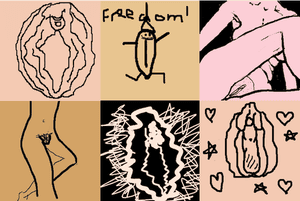Hello!
Here’s the rub: no matter where you stroke or poke, coming can be tricky for some of us. The fact is, men are more likely to orgasm – but did you ever wonder why it’s so difficult for women? We tried to find out in episode three of our video series Vagina Dispatches, which we launched today.
Both Mae and I have found this tricky (and so did the neuroscientist we spoke to, and the pelvic floor therapist, and the sex educator) but that doesn’t mean we can’t work at it. If you can relate, or if you tried out some of our handy tips we mention in the video we want to hear from you. Email us at vaginadispatches@theguardian.com. Don’t worry, we won’t share anything you tell us without your permission.
If you’re reading this and haven’t already signed up for the newsletter, you can do so here.
Bloody vaginas
In episode two, we talked about menstruation – or, rather, the lack thereof. We interviewed Dr Coutinho who felt that having periods is unnatural and spoke to artist Jenn Lewis, who strongly disagreed. A number of commenters were inclined to agree with Jenn, as they wrote in to tell us:
The first episode in this series was about appreciating the natural beauty of the vulva. Having a period is natural, too.
– Camille (on Facebook)
Mae and I explain in the video that we have a hormonal IUD which stops our periods. Viewers also had some valuable thoughts about this method of contraception:
I wanted to point out that there are IUDs that aren’t hormonal and don’t affect the period. I have used a copper IUD (commercial name Paragard) for years and years, I love it because it very effectively and conveniently does the job of birth control and does not change my hormonal balance in the process. Your show gives the impression that IUDs are beneficial because they affect your hormones and stop your periods, first and foremost. Because some women don’t want to tamper with their hormones, you may be discouraging them from IUD use.
It’s true. And we’re reading through all of your responses, questions, and concerns about stopping your periods – and taking them very seriously. In fact, we are compiling a list we plan to present to a doctor. So please keep them coming! Here are a few examples:
- “I’m a pro-sex feminist and joyfully celebrate women and men who don’t want to be parents. And as a woman who had my daughters when I was 37 and 39, I feel very lucky that the plumbing still worked. Not sure it would have, if I’d stopped my period.”– Kathleen, via email
- “I recently read a science reporter’s article about menstruation being so very helpful in removing excess iron in women’s blood that the male scientist involved in the study chose to get bloodletting every other month for a similar outcome … I wonder now if the health problems I had early in life might not have been exacerbated by the fact that I had so few periods, sometimes only two a year.”– Anonymous, via email
- “Is there any scientific research that is been done to understand painful menstruation in women?” – Victoria from Togo, west Africa
Our colleague Aliza Aufrichtig (otherwise known as the brains behind the giant vulva wall) was especially interested in that last one. In her words:
I started having two-week-long periods accompanied by cramps so bad I couldn’t move for days. I bled heavily for 12 to 30 days at a time, often with only days of a break in between. Put another way, the average ovulating woman has bled for a total of nearly one year since the 2012 election but I’ve nearly doubled that. Added together, I’ve had my period for longer than Trump’s presidential campaign. Hard to say which is worse.
Aliza did some digging and turns out, there’s a dearth of research on painful periods.
And – even though no one has specifically asked the question – I started wondering about how your period affects your sex drive. It turns out, it does.
Please forward this message along and share episode three to help spread the genital knowledge. And if you’re enjoying this series, please support our work with a contribution or by becoming a member.
Got more? Email us at vagina.dispatches@theguardian.com. Especially about orgasms.
Sorry Mum,
Mona & Mae

Why is it harder for women to orgasm? A hands-on episode of Vagina Dispatches
Hiç yorum yok:
Yorum Gönder